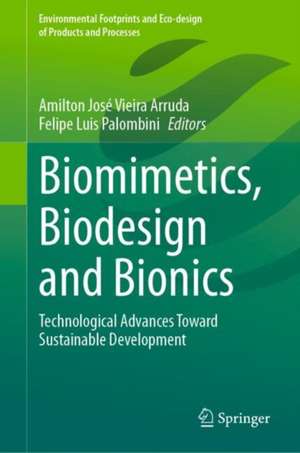Biomimetics, Biodesign and Bionics: Technological Advances Toward Sustainable Development: Environmental Footprints and Eco-design of Products and Processes
Editat de Amilton José Vieira Arruda, Felipe Luis Palombinien Limba Engleză Hardback – 14 mai 2024
Din seria Environmental Footprints and Eco-design of Products and Processes
- 18%
 Preț: 780.06 lei
Preț: 780.06 lei - 18%
 Preț: 1011.77 lei
Preț: 1011.77 lei - 18%
 Preț: 1118.62 lei
Preț: 1118.62 lei - 20%
 Preț: 568.65 lei
Preț: 568.65 lei - 18%
 Preț: 956.09 lei
Preț: 956.09 lei -
 Preț: 359.54 lei
Preț: 359.54 lei - 18%
 Preț: 893.71 lei
Preț: 893.71 lei - 17%
 Preț: 457.13 lei
Preț: 457.13 lei - 18%
 Preț: 891.33 lei
Preț: 891.33 lei - 15%
 Preț: 635.47 lei
Preț: 635.47 lei - 18%
 Preț: 957.32 lei
Preț: 957.32 lei - 18%
 Preț: 1233.83 lei
Preț: 1233.83 lei - 15%
 Preț: 644.63 lei
Preț: 644.63 lei - 15%
 Preț: 581.47 lei
Preț: 581.47 lei - 15%
 Preț: 699.28 lei
Preț: 699.28 lei - 15%
 Preț: 518.30 lei
Preț: 518.30 lei -
 Preț: 388.13 lei
Preț: 388.13 lei -
 Preț: 383.12 lei
Preț: 383.12 lei -
 Preț: 383.50 lei
Preț: 383.50 lei - 15%
 Preț: 642.03 lei
Preț: 642.03 lei - 15%
 Preț: 639.73 lei
Preț: 639.73 lei - 19%
 Preț: 540.94 lei
Preț: 540.94 lei - 15%
 Preț: 642.18 lei
Preț: 642.18 lei - 18%
 Preț: 1117.99 lei
Preț: 1117.99 lei - 15%
 Preț: 639.08 lei
Preț: 639.08 lei - 15%
 Preț: 637.59 lei
Preț: 637.59 lei - 15%
 Preț: 638.76 lei
Preț: 638.76 lei - 15%
 Preț: 696.82 lei
Preț: 696.82 lei - 18%
 Preț: 726.69 lei
Preț: 726.69 lei - 15%
 Preț: 580.49 lei
Preț: 580.49 lei
Preț: 952.09 lei
Preț vechi: 1161.08 lei
-18% Nou
Puncte Express: 1428
Preț estimativ în valută:
182.18€ • 190.90$ • 150.61£
182.18€ • 190.90$ • 150.61£
Carte disponibilă
Livrare economică 21 martie-04 aprilie
Preluare comenzi: 021 569.72.76
Specificații
ISBN-13: 9783031513107
ISBN-10: 303151310X
Pagini: 284
Ilustrații: VI, 284 p. 183 illus., 156 illus. in color.
Dimensiuni: 155 x 235 mm
Greutate: 0.64 kg
Ediția:2024
Editura: Springer Nature Switzerland
Colecția Springer
Seria Environmental Footprints and Eco-design of Products and Processes
Locul publicării:Cham, Switzerland
ISBN-10: 303151310X
Pagini: 284
Ilustrații: VI, 284 p. 183 illus., 156 illus. in color.
Dimensiuni: 155 x 235 mm
Greutate: 0.64 kg
Ediția:2024
Editura: Springer Nature Switzerland
Colecția Springer
Seria Environmental Footprints and Eco-design of Products and Processes
Locul publicării:Cham, Switzerland
Cuprins
Chapter 1 Didactic/Methodological Proposal.- Chapter 2 Bionics and Design.- Chapter 3 Bio-digital 'material systems'.- Chapter 4 Echinodesign.- Chapter 5 Biodigital Product Design.- Chapter 6 Method and processes for abstraction of natural micro-structures for new product development.- Chapter 7 Biomimetics and 4D Printing.- Chapter 8 Innovative trends in academic pavilions.- Chapter 9 Levels of access to biomimetics.- Chapter 10 Biodesign as a tool to achieve sustainable construction through additive manufacturing.
Notă biografică
Dr. Felipe Luis Palombini is an Assistant Professor of the Department of Industrial Design (DDI) and Professor of the Graduate Program of Architecture, Urbanism, Landscaping (PPGAUP) at the Federal University of Santa Maria (UFSM) in Santa Maria (Brazil). Felipe Palombini received his M.Sc. and his Ph.D. in Design and was a Post-Doctoral Researcher fellow in the Graduate Programs of Botany (PPGBot) at the Federal University of Rio Grande do Sul (UFRGS), in Porto Alegre (Brazil). His main research topics are focused on Bionics, Sustainability, Design, Cellular Materials, and Materials Characterization via Finite Element Analysis and X-ray Microtomography. He is the Lab head of the Innovation and Sustainability in Design Lab (NOVA/UFSM), and is associated with the Design and Computer Simulation Research Group (DSC/UFRGS), and the Plant Anatomy Laboratory (LAVeg/UFRGS).
Dr. Amilton J. V. Arruda. Graduate in Product Design Industrial Design from UFPE (1982), Master in Design and Bionics from the IED of Milan (1992), Doctorate in Research in Industrial Design - Ph.D. by Polytechnic University of Milan (2002) and post-doctorate in Design and Bionics from IADE European University UNIDCOM Lisbon (2018/2019) and Luigi Vanvitelli Naples (2021/2022). Since 1985 professor of the Design Course from UFPE. He is currently an Associate Professor IV. Coordinates the Biodesign and Artifacts Industrial Research Group.
Dr. Amilton J. V. Arruda. Graduate in Product Design Industrial Design from UFPE (1982), Master in Design and Bionics from the IED of Milan (1992), Doctorate in Research in Industrial Design - Ph.D. by Polytechnic University of Milan (2002) and post-doctorate in Design and Bionics from IADE European University UNIDCOM Lisbon (2018/2019) and Luigi Vanvitelli Naples (2021/2022). Since 1985 professor of the Design Course from UFPE. He is currently an Associate Professor IV. Coordinates the Biodesign and Artifacts Industrial Research Group.
Textul de pe ultima copertă
Nature is a vast source of inspiration and information for the resolution of complex problems and can influence many varieties of design. Biomimetics, biodesign and bionics are three branches of interdisciplinary research merging biological and applied sciences. This volume collects cases that highlight recent breakthroughs in these disciplines. Biological features such as patterns, shapes, mechanisms, colors, structures, and more can be analyzed, organized, and modeled for application in human creations. Therefore, design, engineering, and architecture projects can benefit from solutions that were already tested and verified through evolution in the natural world. With the development of new technologies for the investigation, simulation, and testing of natural features, the path from nature to product can be accelerated. The cases presented in this work showcase how technological advancements are leading to improved design solutions and influencing our very comprehension of nature and its complex organization.
Caracteristici
Highlights recent advances in nature-inspired projects and technologies Features case studies from around the world highlighting new applications of nature for inspiration for applied sciences Show the potential and current perspectives of biologically-driven design towards sustainable development
